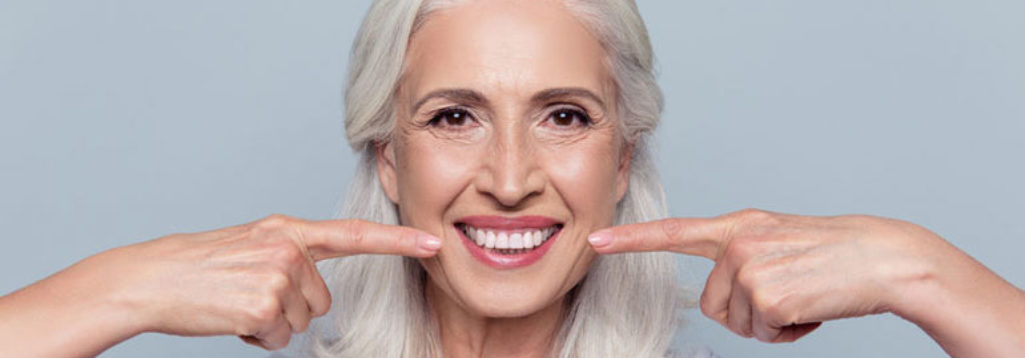
|

|

|

|

Caring for dentures – do’s and don’ts
Millions of people all over the world wear dentures. Among these people there is a large chunk of population who are edentulous that is they have no teeth at all. And there are millions who are missing from one to many teeth.
It is a rough estimate that among all these people with one or more teeth missing, around 90% of people wear some kind of dentures.
Dentures are made to replace missing teeth. Dentures are prostheses which are fitted onto remaining teeth, or are fitted onto implants. They can be complete or partial. The materials used for them also varies a lot based on factors like cost, loss of bone in the patient, how many teeth are being replaced, and personal preferences of patients.
Since a lot of time and money are spent on getting the dentures fabricated and fitted on individual patients, it is important that we know the basic rules of care and maintenance of the dentures.
Dentures are basically replaced teeth. They behave like real teeth in many ways. Like real teeth, the dentures accumulate plaque and calculus and get stained. If dentures are not cleaned well, they accumulate bio film which is responsible for development of problems in the mouth. Dentures need cleaning with toothbrush too just like natural teeth.
Usually the dentists provide detailed instructions of how to take care of dentures.
Then there are instances when you need to replace your dentures and get new ones fabricated and fitted.
Reasons when you need to replace your dentures:
- Chronic irritation beneath the dentures.
- Fissures, ulcers, and denture stomatitis
- When denture adhesives are required to keep the dentures in place
- When adhesives are used very often more than once in a day.
- When denture has worn out so much that it does not align with other teeth and doesn’t fit snug in the mouth,
- When the prosthetic becomes discoloured, or broken or develops cracks.
- When the supporting tooth changes in position or size
- If the denture is being used for more than 5 years
Our physical features change over time. The shape of our face, mouth, gums, cheeks and tissues change as we age. The dentures may not fit properly over time and will need to be made new.
How to take care of your dentures
Dentures are replaced teeth and therefore they require to be cleaned everyday like natural teeth. Food particles and bacteria get stuck to dentures like they do to our natural teeth. These will have to be removed daily by brushing them with a soft bristled toothbrush. If we neglect to brush our dentures, there will be possibilities of staining the dentures.
How to keep dentures clean?
Dentures should be cared for the safety of dentures and also your mouth.
Rinse: Rinsing the dentures is the first step to clean them. It will remove loose food particles and any adhesives stuck on them.
Brushing the dentures every day is a must. It will not only remove food and plaque, but also help in preventing stains. Soft bristled brushes are specially made for cleaning the dentures. Hard bristles can damage denture surfaces.
Brushing should be done gently. Take care not to damage the plastic behind or bend the attachments.
Dentures should be rinsed after every meal.
Even if you are using commercial cleansers, brushing and rinsing is a must.
Ultrasonic devices are also available which dislodge food particles with sound waves.
The next step would be to use commercial cleansers if you are given prescriptions for them. Commercial cleansers come in a variety of forms like tablets, pastes, creams, gels and solutions. If you are using denture cleanser tablets, then drop them in lukewarm water which will create a vaporous solution to effectively clean dentures. Place your dentures in the solution and let them soak for a while.
Soaking the dentures in solutions help in getting rid of bacteria which have accumulated on them while in mouth. Removing bacteria helps in removing the odour from dentures.
Always follow manufacturer’s instructions about how long the dentures can remain in the solution.
Denture cleansing gels and creams are usually brushed on to the dentures after they have been taken out of the mouth. Rinse them with water before applying cleansing gels or pastes or cream.
Never use denture cleansing agents while dentures are worn in the mouth.
It is fine if instead of commercial denture cleaners, you use specially made for dentures toothpastes or mild hand wash liquid which is not harsh. Mild dishwashing liquid can be used too. This should be applied with a soft brush and warm water. Never use powdered cleansers or bleach. It is damaging to dentures.
It is advised to stand on a towel so that your dentures will not be damaged even if you drop them accidentally.
Never use bleach. It will whiten the pink part of your dentures which is used to match with the colour of jaws and tissues in the mouth.
You should never use hot water to clean your dentures. It will damage the plastic parts of the dentures.
Never try to adjust your dentures yourself. Bending metal clasps and other parts will permanently damage the dentures.
If you think dentures are not properly fitting, ask for an appointment with your prosthodontist.
Oral Hygiene
It is vital for your dental health and for a longer life of your dentures that you keep your oral hygiene regime perfect.
You must follow the oral hygiene routine in the same way as you would for your natural teeth.
If you wear partial dentures than take care of your natural teeth with regular routine of brushing and flossing. Take care of your dentures as discussed above.
Brush your gums, tongue and palette every morning before you put on your dentures. Take care to brush the teeth that fall under the clasp of the denture. The plaque that is trapped under the clasp can increase the risk of tooth decay.






